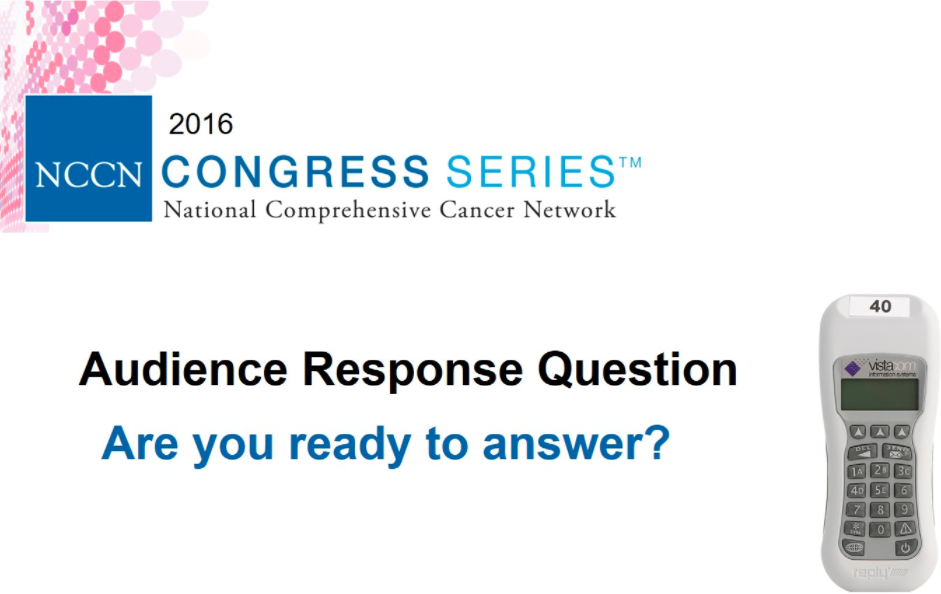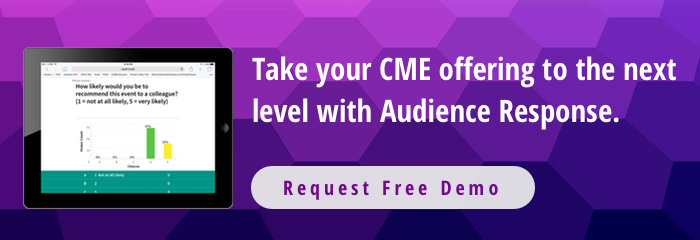A broad range of continuing medical education (CME) offerings exist to assist doctors in enhancing their clinical decision making and patient care. The impact of these programs on the quality of physicians’ clinical practice outcomes depends on the quality of CME offerings’ content delivery and program design. Research has shown that traditional lecturing formats are ineffective at driving knowledge retention, and improving practice behavior.
Experts from the Agency for Healthcare Research and Quality and other renowned organizations have found CME programs that engage physicians in live, interactive learning are comparatively more effective at driving new information absorption and effecting change in physician behavior that leads to improved patient outcomes.
The National Comprehensive Cancer Network® (NCCN®) has used audience response (ARS) as a tool for delivering interactive, high quality CME programming since 2002. As one of Vistacom’s longest standing partners, the NCCN Conferences and Meetings Department developed three techniques for enhancing the performance of ARS before, during, and after each event. Each one is outlined below.
Simulating clinical problem solving with ARS
NCCN advises their speakers to incorporate polls into their presentations whether they are speaking for 20 minutes or an hour. Polls are communicated to physicians, nurses, and other health care providers who present at NCCN’s educational events as a superior alternative to traditional lecturing formats.
Speakers commonly incorporate ARS polling into their lecture when presenting case studies:
- Before presenting the results of the case study, the speaker polls audience members on how they would react to the case being presented
- After presenting the results of the case study, the speaker re-polls audience members to see if their preferred treatment has changed
- Audience members are encouraged to discuss their voting choice before moving on from the case study
Gauging knowledge retention with live data capture
NCCN encourages speakers and panelists to deliver before and after polls to audience members and uses this information to evaluate their attendee’s knowledge retention and skill development. At the end of each event, the NCCN Conferences and Meetings Department consults their ARS vendor’s reporting to determine which elements of their offering is most likely to influence practice behavior once their attendees return to the medical setting.
Speakers and panelists leverage ARS to gauge understanding in real time:
- To kick off their panel session or presentation, the speaker or moderator poses questions designed to gauge their audience’s understanding of the topic at hand
- At the end of the panel or presentation, the audience is polled again to determine whether their understanding has changed or new information has been taken away
- Post event, data reports are examined to determine which sessions were effective at influencing the attitudes and decisions of attendees
Communicating preferred practices
NCCN’s team of project managers and event organizers have developed a formula for successful audience response delivery. By sharing these best practices, they achieve exceptionally high participation in ARS live polling.
Speaker/Moderator instructions:
- Event moderators are instructed on how to explain the ARS polling process to attendees
- Session leaders are instructed to actively encourage attendees to participate in live polls
- The final speaker or moderator is instructed to remind attendees that they should leave the ARS keypads on the tables
Attendee instructions:
- A buffer slide that includes an image of an ARS keypad is shown one slide before polls are administered. This slide informs attendees that it is time for them to vote.
- Attendees are instructed to leave their ARS keypad at their table after each session. This eliminates the risk of attendees forgetting to return a keypad post-event

Buffer Slide Example from NCCN
Vendor instructions:
- Project managers share a detailed agenda of when each presenter is (or is not) utilizing audience response with their ARS technician
- Project managers are instructed to upload the slides that presenters’ intend to use within one week of the program. This ensures that their ARS technician is not left to create slides from scratch and has time to manage last minute slide adaptations once on-site
—
Using these program design and delivery techniques, NCCN has successfully informed and engaged thousands of physicians and medical professionals in improving cancer care. Their CME offerings’ performance improvements serve as a testament to the role of audience response in enhancing the quality of continued medical education courses and events.
Get in touch and learn how you, too, can deliver high quality, live and interactive programming with ARS.

